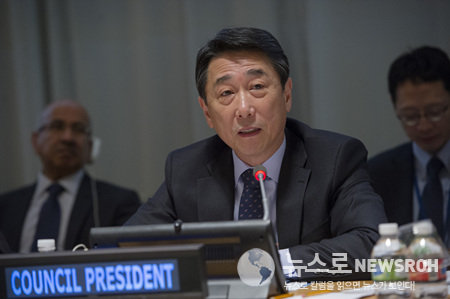
불평등은 진정한 글로벌 과제이다. 필자가 ‘글로벌’을 강조하는 이유는 불평등(不平等)이 선진국·개도국 양측 모두에게 중요한 문제이기 때문이다.
(선진국 내 불평등이 보다 눈에 띄기는 하지만) 선진국 및 개도국 공히 하위 소득계층 50%는 종종 전체 부의 10% 미만을 점유하고 있다. 국가간 불평등도 우려가 되기는 마찬가지다. 예를 들어, 아프리카 국가들의 2015년 평균 1인당 소득은 선진국 평균 1인당 소득의 12%에 불과했는데, 이러한 상황은 1990년 이래 거의 변함없이 지속되고 있다.
불평등은 소득과 재산의 격차 이상을 포괄하는 다차원적 문제다. 현재 다수 국가에서 총 12억명이 하루 1.25불 미만으로 살아가고 있는데, 광범위한 접근(access) 및 기회의 불평등이 문제를 보다 심각하게 만들고 있다. 5억7천만명의 어린이가 초등학교를 다니지 못하고 있고 4억명은 필수적인 보건 서비스를 누리지 못하고 있다. 인간에게 필요한 이러한 기본 요소들에 대한 불평등한 접근은 다시 불평등과 빈곤이라는 이어진다는 악순환(惡循環)을 창출한다. 이러한 취약성은 특히 분쟁이나 인도적 위기에서 갓 벗어나고 있는 국가들에서 특히 심각하다.
어떤 이들은 기술적 진보가 자연스럽게 전체적인 부(파이)를 확대시킴으로써 모두에게 혜택이 돌아가고 (가장 작은 파이 조각마저 커지고), 이에 따라 불평등 감소에 기여할 것이라고 주장해 왔다. 하지만, 우리가 지난 수십년간 인류 역사상 최고의 과학‧기술상 발전을 누려 왔음에도, 수치들은 부와 소득의 격차가 지속적으로 벌어져 왔음을 보여주고 있다. 이러한 불평등은 도덕적으로 정당화하기 어렵고 성장 및 개발에도 악영향을 미친다. 또한 정치적, 사회적 불안을 조성할 수 있다.
이에 따라 불평등에 대응하기 위한 집단적 조치가 필요하다는 합의가 자라나고 있다. 불평등 문제의 보편적 성격을 감안시, 유엔은 가장 적절한 논의의 장이라고 할 것이다. 현재 필자가 의장을 맡고 있는 유엔 경제사회이사회는 3월30일 뉴욕에서 불평등에 대한 특별회의를 개최할 예정이다. 회의에는 학계, 정책 입안자, 시민사회 대표들이 참석하여 국내 및 국가간의 불평등을 줄이기 위한 방안을 권고하게 될 것이다.
불평등 특별회의는 또한 지난해 9월 채택되었으며 향후 15년간 보다 나은 세상을 만들기 위한 보편적인 경제·사회·환경적 목표들로 구성된 지속가능개발목표에 대한 기여를 목적으로 한다. 불평등 대응은 단독 이슈이자 교차 이슈로, 지속가능개발의제의 성공적 이행(移行)에 매우 중요하다.
이 새로운 개발 구상에서 누구도 소외시키지 않기 위해, 우리는 불평등 문제에 조속히 대응해야 한다. 경제사회이사회는 불평등이 심화되는 흐름을 바꾸기 위한 노력의 최일선상에서, 우리의 공동체 내에서 가장 소외되고 취약한 사람들의 삶을 개선해 나갈 것이다.
글 오준 유엔대사 / 유엔경제사회이사회(ECOSOC) 의장
* 이글은 허핑턴 포스트 기고문을 번역한 것으로 '글로벌웹진' 뉴스로(www.newsroh.com) 의 '열린기자'에 오른 글입니다. 아래는 원문.
Inequality : a Global Challenge Requiring Global Solutions
Inequality is truly a global challenge. I emphasize “global” because inequality matters in all countries—both in the developing and the developed world.
In developed and developing countries alike (although the trend is more noteworthy in rich countries) the poorest half of the population often controls less than 10% of wealth. Equally worrying are the differences among countries. For example, African countries’ average per capita income in 2015 was equal to just 12 per cent of the per capita income in developed countries—a figure that has remained largely unchanged since 1990.
Inequality is an issue with multiple dimensions that encompasses more than gaps in income and wealth. The fact that 1.2 billion people continue to live on under US$1.25 a day in many countries is further compounded by vast inequalities in access and opportunity. There are 57 million children who cannot attend primary school, while 400 million people lack access to essential health services. Unequal access to such basic human needs in turn create vicious circles of inequality and poverty. These vulnerabilities are particularly acute in countries emerging from conflict or humanitarian crises.
Some have argued that technological progress will naturally enlarge the entire share of wealth (the pie) and benefit everyone (with even the smallest piece of the pie getting larger) thereby contributing to reducing inequality. However, while we have enjoyed the most spectacular advances in science and technology in human history for the last few decades, numbers have shown that the gaps have been consistently widening in wealth and income. Such inequality is morally indefensible and bad for growth and development. It could also give rise to political and social instability.
Consensus is therefore growing for collective action to address inequality. Given its universal nature, the United Nations would be the most suitable forum to discuss this challenge. The United Nations Economic and Social Council (ECOSOC), which I currently chair, will convene a Special Meeting on Inequality on 30 March in New York, inviting thought leaders, policymakers and civil society representatives to make recommendations on reducing inequalities within and between countries.
The Meeting is also aimed at contributing to the Sustainable Development Goals (SDGs), adopted by UN Member States in September 2015, which comprise a universal set of economic, social and environmental goals to improve the state of the world between now and 2030. Simultaneously a stand-alone and cross cutting issue, addressing inequalities is instrumental for the successful implementation of the 2030 Agenda.
In order to leave no one behind in this new development initiative, we should work with urgency to address inequalities. Standing on the frontline to reverse inequality trends, ECOSOC is committed to improving the well-being of those hardest to reach—and most disadvantaged—in our own communities.

















![[특파원 리포트] 프린스턴 발 PNKHR의 기세가 몽골에 부디 확산되기를](http://okja.org/files/thumbnails/480/021/200x145.crop.jpg)




